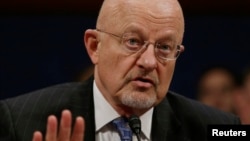CAPITOL HILL —
America's top intelligence official says Afghan President Hamid Karzai is unlikely to sign a security agreement with the United States, leaving the long-term relationship between the two countries undefined as U.S. combat troops withdraw.
For months, the United States has urged Karzai to sign the Bilateral Security Agreement (BSA) he negotiated with the Obama administration. But Karzai has refused. U.S. intelligence chief James Clapper told senators the deal may not be finalized on President Karzai's watch.
"It takes two [people] to sign this. And my own view, not necessarily company [official U.S.] policy, is I do not believe President Karzai is going to sign it," said Clapper.
The Bilateral Security Agreement would keep about 10,000 U.S. troops in Afghanistan in a supportive role for a decade. Karzai has objected to U.S. military tactics in his country, especially raids of Afghan homes, and said he wants assurances of a dialogue with Taliban militants.
The Obama administration has threatened to terminate America's military role entirely if the accord is not signed.
U.S. domestic support for military operations in Afghanistan is at an all-time low, and President Karzai's actions are making a bad situation worse, according to Senate Armed Services Committee Chairman, Democrat Carl Levin.
"President Karzai has so far refused to sign the BSA that he himself agreed to, and has made a series of statements so inflammatory that they are undermining public support in the United States for continuing efforts in Afghanistan," said Levin.
Republican Senator Lindsey Graham put it more bluntly.
"President Karzai, in my view, is single-handedly destroying this relationship. And I want the people of Afghanistan to know that I yearn for a supportive relationship - politically, economically and militarily," said Graham.
Meanwhile, the Department of Defense is reacting to reports Afghanistan will release dozens of insurgent detainees later this week. A Pentagon spokesman, Colonel Steve Warren, described the militants as a threat to U.S. forces.
"Of course, we would try to kill or capture them as the battlefield situation presents," said Warren.
Warren added U.S. military options become more constrained the longer the BSA goes unsigned, while the Taliban is emboldened.
For months, the United States has urged Karzai to sign the Bilateral Security Agreement (BSA) he negotiated with the Obama administration. But Karzai has refused. U.S. intelligence chief James Clapper told senators the deal may not be finalized on President Karzai's watch.
"It takes two [people] to sign this. And my own view, not necessarily company [official U.S.] policy, is I do not believe President Karzai is going to sign it," said Clapper.
The Bilateral Security Agreement would keep about 10,000 U.S. troops in Afghanistan in a supportive role for a decade. Karzai has objected to U.S. military tactics in his country, especially raids of Afghan homes, and said he wants assurances of a dialogue with Taliban militants.
The Obama administration has threatened to terminate America's military role entirely if the accord is not signed.
U.S. domestic support for military operations in Afghanistan is at an all-time low, and President Karzai's actions are making a bad situation worse, according to Senate Armed Services Committee Chairman, Democrat Carl Levin.
"President Karzai has so far refused to sign the BSA that he himself agreed to, and has made a series of statements so inflammatory that they are undermining public support in the United States for continuing efforts in Afghanistan," said Levin.
Republican Senator Lindsey Graham put it more bluntly.
"President Karzai, in my view, is single-handedly destroying this relationship. And I want the people of Afghanistan to know that I yearn for a supportive relationship - politically, economically and militarily," said Graham.
Meanwhile, the Department of Defense is reacting to reports Afghanistan will release dozens of insurgent detainees later this week. A Pentagon spokesman, Colonel Steve Warren, described the militants as a threat to U.S. forces.
"Of course, we would try to kill or capture them as the battlefield situation presents," said Warren.
Warren added U.S. military options become more constrained the longer the BSA goes unsigned, while the Taliban is emboldened.
